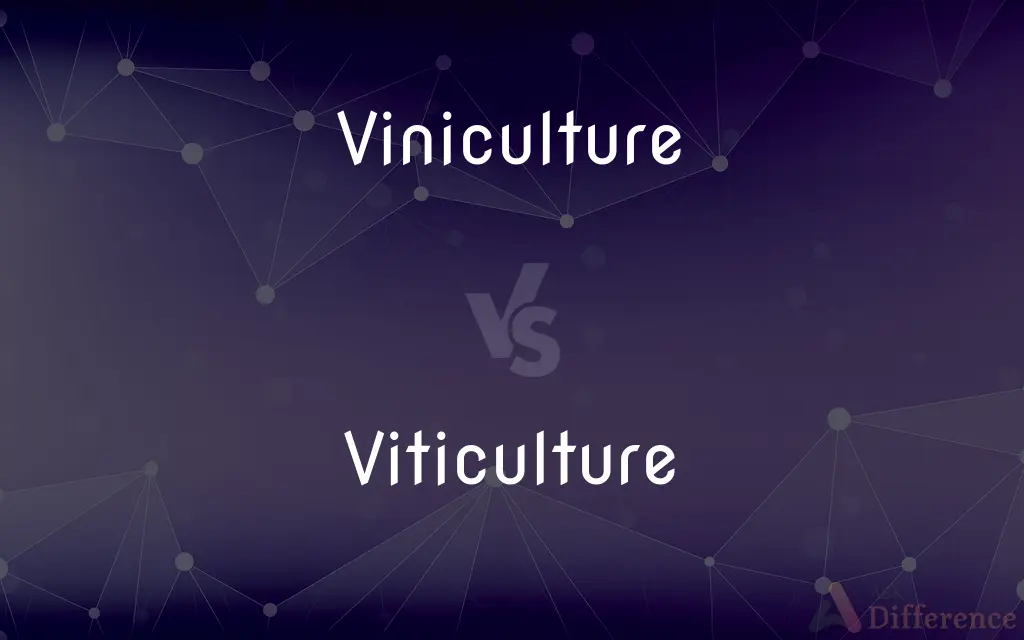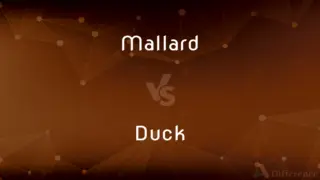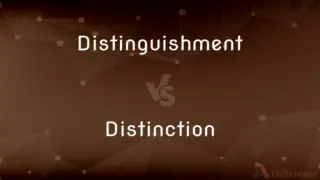Viniculture vs. Viticulture — What's the Difference?
By Urooj Arif & Maham Liaqat — Updated on April 22, 2024
Viniculture and viticulture both pertain to grape cultivation, but viniculture focuses specifically on wine production, while viticulture encompasses all aspects of grape growing.

Difference Between Viniculture and Viticulture
Table of Contents
ADVERTISEMENT
Key Differences
Viticulture is the science, cultivation, and study of grapes, primarily for the purpose of winemaking but also for fresh grapes and other products. Viniculture, on the other hand, specifically refers to the cultivation of vineyards for wine production, including the processes involved after the grapes are harvested.
A viticulturist focuses on grape production, considering factors like climate, soil type, and vine disease management to ensure the best quality and yield. Conversely, a viniculturist is concerned with these factors as well but with an eye toward how they impact the final wine product.
Viticulture involves practices such as planting, training, and pruning grape vines. In contrast, viniculture includes not only these steps but also extends to the harvesting, fermentation, and aging processes which are crucial for producing wine.
The expertise required in viticulture is broad, covering agronomic sciences to maximize grape yield and quality. Viniculture requires additional knowledge in enology (the science of wine and winemaking), emphasizing the chemistry and techniques needed to convert grapes into wine.
While all viniculture is a part of viticulture, not all viticulture results in viniculture, as not all grapes grown under viticulture practices are destined for wine production; some are sold as table grapes or used to produce grape juice.
ADVERTISEMENT
Comparison Chart
Focus
Growing grapes
Making wine from grapes
Scope
Includes all grape uses
Specifically focused on wine production
Key Processes
Planting, training, pruning vines
Harvesting, fermenting, aging wine
Requires Knowledge in
Agronomy, plant science
Enology, wine chemistry
End Products
Grapes for various uses
Wine only
Compare with Definitions
Viniculture
The agricultural practice of growing grapevines.
He studied viticulture to improve his grape yields.
Viticulture
The cultivation of grapevines for winemaking.
Viniculture requires a deep understanding of both agriculture and chemistry.
Viniculture
The industry and culture surrounding grape cultivation.
The Napa Valley is renowned for its advanced viticulture.
Viticulture
The subset of viticulture dedicated to wine grapes.
His focus in viniculture led to the production of award-winning wines.
Viniculture
The science dealing with grape production.
Viticulture techniques have evolved significantly over the past decades.
Viticulture
The art and science of transforming grapes into wine.
Viniculture blends traditional practices with modern technology to enhance wine quality.
Viniculture
A field within horticulture focused on vine growing.
Viticulture is essential for producing high-quality grapes.
Viticulture
The process involved in producing wine from vine to bottle.
Viniculture has been refined over centuries, particularly in regions like Bordeaux and Tuscany.
Viniculture
Practices involved in cultivating healthy grapevines.
Effective viticulture involves careful soil management and pest control.
Viticulture
Techniques used to optimize grape characteristics for wine.
Selective pruning in viniculture can influence the wine's flavor profile.
Viniculture
The cultivation of grapes; viticulture.
Viticulture
Viticulture (from the Latin word for vine) or winegrowing (wine growing) is the cultivation and harvesting of grapes. It is a branch of the science of horticulture.
Viniculture
The cultivation of grapes, especially those used to produce wine.
Viticulture
The cultivation of grapes, especially for use in making wine.
Viniculture
The cultivation of the vine, esp. for making wine; viticulture.
Viticulture
The agricultural practice of growing grape vines.
The old French farmer practiced viticulture and raised some of the best grapes in the world. He was knowledgeable in viticulture.
Viniculture
The craft and science of growing grapes and making wine
Viticulture
The cultivation of the vine; grape growing.
Viticulture
The cultivation of grape vines; grape growing
Common Curiosities
What is the main difference between viticulture and viniculture?
Viticulture refers to all aspects of grape cultivation, while viniculture focuses specifically on producing wine.
Can you study viniculture without knowledge of viticulture?
Understanding viticulture is fundamental to mastering viniculture, as it provides the basic knowledge of growing grapes.
Are there viniculture practices that don't involve viticulture?
No, all viniculture practices begin with viticultural knowledge, particularly how grapes are grown.
What kind of grapes are used in viniculture?
Viniculture typically uses varieties best suited for winemaking, such as Cabernet Sauvignon, Merlot, and Chardonnay.
What products result from viticulture that are not wine?
Besides wine, viticulture can produce table grapes, raisins, and grape juice.
How does climate affect viticulture and viniculture?
Climate impacts the growth of grapevines and the timing of winemaking processes, influencing both viticulture and viniculture.
Why is soil type important in viticulture but also viniculture?
Soil type affects the growth of grapevines and the flavor profile of the wine, making it crucial in both fields.
What are common diseases that affect both viticulture and viniculture?
Diseases like powdery mildew and grapevine phylloxera affect grape production and, subsequently, wine quality.
What is the educational path for a career in viticulture or viniculture?
Careers often start with degrees in horticulture, agronomy, or enology, with further specialization in viticulture or viniculture.
Is viniculture considered a part of viticulture?
Yes, viniculture is a specialized branch of viticulture focused on wine production.
How has technology impacted viticulture and viniculture?
Advances in technology have improved practices in both fields, from more efficient watering systems to better fermentation techniques.
What are some regions famous for viniculture?
Regions like Bordeaux, Tuscany, and Napa Valley are famous for their vinicultural practices.
How do seasonal changes impact viticulture and viniculture?
Seasonal variations influence vine growth cycles and harvest times, crucial for both viticulture and viniculture.
What are the sustainability practices in viticulture and viniculture?
Sustainable practices include organic farming, reduced water use, and minimizing chemical inputs, applicable to both fields.
Can viniculture practices alter the taste of wine?
Yes, techniques used during viniculture, such as fermentation and aging, critically shape the wine's final taste.
Share Your Discovery

Previous Comparison
Mallard vs. Duck
Next Comparison
Distinguishment vs. DistinctionAuthor Spotlight
Written by
Urooj ArifUrooj is a skilled content writer at Ask Difference, known for her exceptional ability to simplify complex topics into engaging and informative content. With a passion for research and a flair for clear, concise writing, she consistently delivers articles that resonate with our diverse audience.
Co-written by
Maham Liaqat















































